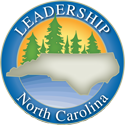Since 1995, Leadership North Carolina has provided cutting-edge programming to current and emerging leaders from across the state. Every summer LNC selects a class of engaged citizens to learn about issues related to government, economic development, health and human services, education, the environment, and inclusive leadership. Each class of approximately 55 leaders attends an orientation retreat and six two-day sessions during the LNC program year. Sessions combine presentations, tours, experiential learning activities, and facilitated dialogue to educate participants about challenges and opportunities facing the state. The LNC program supports the exploration of multiple perspectives in a safe and respectful environment. LNC class members build their personal and professional networks as they work to turn knowledge into action and leverage resources for the benefit of the state and its people.
Government
For the first topic session of the program year class members gather in Raleigh to focus on state and local government. Representatives from various levels of government join the group to explain their roles and responsibilities, how they interact with one another, and the scope of the services each provides. Interactive legislative and budgeting simulations offer participants new insight into the legislative process and a greater appreciation for the many competing priorities involved in constructing a state budget. This session also addresses significant political trends and the implications of recent elections. Links across the five LNC topic areas emerge as participants interact with key decision-makers and explore ways their own leadership qualities can be leveraged to move the state forward.
Economic Development
North Carolina is becoming known for a variety of industries, from biotechnology to finance, as well as for its ability to adapt existing resources and infrastructure to meet present and future needs. During the Duke Energy Economic Development session members gain an understanding of the evolution of North Carolina’s economy from its roots in textiles, agriculture, and furniture to the state’s emergence as a leader in entrepreneurship. They hear from economic developers, business owners, and policy experts about the principles and priorities of economic development and about strategies for how every North Carolinian can cultivate the state’s economic growth. Through dialogue and experiential learning, this session focuses on opportunities and challenges facing rural and urban communities, economic trends, gaps in economic and workforce development, and expectations for the future.
Health and Human Services
The Blue Cross and Blue Shield of North Carolina Health and Human Services session explores issues around health care costs and access as well as topics such as hunger and nutrition, mental illness, and the aging of the state’s population. Presenters identify the roles various sectors play in supporting a healthy population and address the costs of poor health on areas such as education and economic development. Participants gain a better understanding of the roles government, nonprofits, businesses, and communities play in promoting healthy citizens and explore opportunities for improving the business and the art of health care. A unique and compelling simulation lets class members step into the shoes of struggling North Carolinians while also giving back to the session’s host city. Throughout this session class members engage with one another as they explore their own roles and responsibilities related to health and human services.
Education
During the Education session participants learn about the structure of the state’s education systems and the diverse opportunities they offer in a national and global context. Teachers, administrators, policy makers, and experts share a variety of perspectives about the challenges and opportunities facing the state and nation and explain how North Carolina measures up. This session addresses the full scope of the state’s education system, from early childhood programs through post-graduate and technical training opportunities. Through discussions and activities participants evaluate funding streams, explore demographic trends, and assess the impact our state’s educational system has on other sectors. They learn about innovative programs, discuss strategies for overcoming challenges, and explore how each of them can make a difference.
Environment
LNC’s Environment session defines the broad topic of “the environment” and uses tours, interactive exercises, and presentations from experts to answer questions such as: Are we making the best choices to preserve our natural resources while seeking opportunities to grow? What can individuals do to make a difference? How are technology, entrepreneurship, and collaboration changing traditional views of the environment and economic development, and what are the emerging trends? During this session class members explore the pros and cons of a variety of energy options, learn about the economic and policy dynamics at play, and see examples of sustainability and cutting-edge research in action. This session also offers participants tools and strategies they can implement to have a positive impact on their environment.

